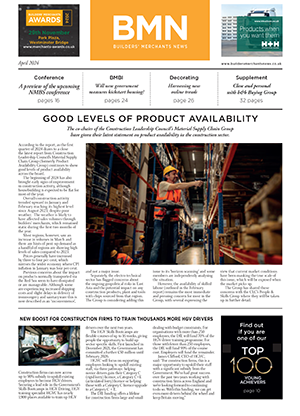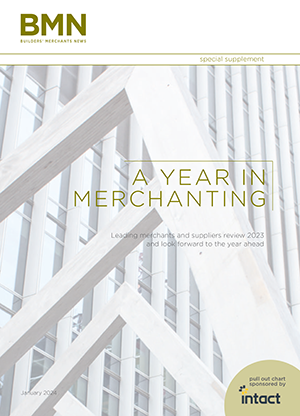Jonno Barrett, managing director of Kudos Software, tells Jennie Ward why a successful IT system should integrate an entire merchant’s business to improve the customer service offering.
Kudos Software designs electronic point of sale (EPoS) and stock management systems for a wide range of companies, including builders’ merchants. These systems offer features which enable merchants to keep fully in control of their entire business, from stock control to credit accounts and product data.
Jonno Barrett, managing director of Kudos Software, believes this type of fully integrated system is vital for merchants who pride themselves on offering the best possible service to their customers.
 “For us, the name of the game is connecting all parts of the business operationally,” said Mr Barrett. “The function of what we do is to let everybody do their job better, and to integrate the point-of-sale with the rest of the business.”
“For us, the name of the game is connecting all parts of the business operationally,” said Mr Barrett. “The function of what we do is to let everybody do their job better, and to integrate the point-of-sale with the rest of the business.”
Mr Barrett believes that there shouldn’t be a distinction between point-of-sale and departments such as purchasing and stock control. “It’s important the whole process is integrated because the reason the purchasing department exists is in order to have things to sell. Particularly with builders’ merchants where you have special ordering going on and it’s important to have good communication. What we really do is connect the back-office people to the customer.”
Mr Barrett believes that modern builders’ merchant businesses need a system that links the point-of-sale with every part of the business, right through to the final delivery. “We should be delivering to the counter the wisdom of the back office,” he explained. “It’s not just about pricing, but being able to say ‘we haven’t got any of those, but I know there’s some coming in next week’, because you can see on the system that they’re on order. Being able to offer higher levels of service is important.”
Merchant wisdom
With merchants facing increased competition from online businesses, Mr Barrett believes having this information at your fingertips can help merchants promote the added value that a physical branch-based business can provide.
“Most people don’t sell to anyone – they just take orders. But I would go to a builders’ merchant for wisdom,” he said. “If I want a technical product I’d like someone to make me feel sure that I’m buying the right thing, and if the merchant has that information at the point of service then they can offer that advice because the details are on the screen.”
Mr Barrett stressed that this also makes it easier for merchants to make additional sales because they can see, for example, what size screw a particular product takes, and ask if the customer needs those as well. “I can’t remember the last time I went into my local builders’ merchant and had someone say to me ‘do you want one of these, since you’re buying one of those?’,” he said.
Controlling stock
One of the biggest key metrics that Kudos’ software deals with is stock management. The economic downfall has prompted many merchants to cut their stock levels in an attempt to reduce the amount of money they have tied up in product at any given time, which means they have to be more aware of what they hold, and what they’re going to need. The competition from online retailers offering products on next-day delivery also means they have to be able to get the stock to the customer much faster than used to be the case.
“Ideally, merchants should have fairly sophisticated underlying seasonal replenishment algorithms, which allow them to press a button and have the system tell them, with reasonable accuracy, what they might want to think about buying,” said Mr Barrett. “You have to have a very sophisticated system before it automatically takes into account that the forecast for two weeks’ time is expected to be sunny so you’d better get some more paint.
“The key thing with replenishment software is to avoid running out of the last one. If you can be confident in that, then you can run lower stock levels. That allows you to do something quite critical with your stock investment – have a broader, but flatter, stock profile – so that if someone goes into the branch they know you will be able to fulfill their need.”
Having a thorough understanding of your company’s stock management also allows you to make more informed decisions about product lines and margins, before deciding whether to remove a product line or not.
“It’s an interesting distinction when you’re dealing with thousands of product lines,” he said, “whether to buy bigger amounts less often, or smaller amounts more frequently. You may only sell five of one particular product line in a month, but if the margin is enough that you’d have to sell 500 of a faster-moving line to gain the same, then it might be worth keeping.”
A healthy balance between re-order quantities, delivery times, margins and stock investment will provide better returns on investment for merchants.
“We did an exercise on seasonal paints in the marine sector, where lots of people use a particular type of paint at a certain time of year to protect the bottom of boats,” explained Mr Barrett. “It’s a really expensive product, so people buy a lot of it to get a better margin, then compete with each other and have to start discounting because they know if they haven’t got rid of the stock by the end of April then they’re in trouble.
“We did some modelling and we found that, in terms of return on capital investment, it was actually better to buy smaller amounts each week at full price than to buy it all at the beginning, even at a 30% discount, because of the amount of capital the larger purchase ties up.
“The general principle is you’re tying up £6,000 rather than £500 and therefore you could be spending that other £5,500 on a wider assortment, which makes your business better-looking to buy from than the business down the road or on the internet.”
This strategy also helps with the business’ cash flow, which is particularly important for merchants.
“We see stock as a dynamic, not just a value. Importantly, we also see stock in terms of time. So we’re saying ‘you’ve got enough stock for two weeks’, rather than ‘you’ve got 10 items’.”
Kudos Software offers modular software that covers purchasing and purchase order processing, stockholding evaluation and pricing, with features specific to builders’ merchanting.
 “As an example, if someone comes in and asks to purchase enough paint to cover a 12ft by 8ft wall, you can type in the measurements and the software will tell you how much paint you’ll need. It’s again about offering an added-value service.”
“As an example, if someone comes in and asks to purchase enough paint to cover a 12ft by 8ft wall, you can type in the measurements and the software will tell you how much paint you’ll need. It’s again about offering an added-value service.”
Another benefit that Kudos Software’s products can offer merchants on their customer accounts is the ability, when they make a sale, to mark down on the customer’s invoice which job the product is for. When the customer gets his monthly account bill from the merchant, it already lists everything he’s bought and also which job he purchased it for. This makes it easier for the merchant’s customer to run a more efficient business, saving time when preparing invoices.
“It’s all about added value,” concluded Mr Barrett. “We can also integrate our products with Sage and other accounting software, and offer real-time point of sale and training for new customers. For delivery departments we have a system whereby someone with a fairly modern mobile can get a delivery confirmed and signed by the customer, through a phone or tablet.”
This article first appeared in the June 2013 issue of Builders' Merchants News.






